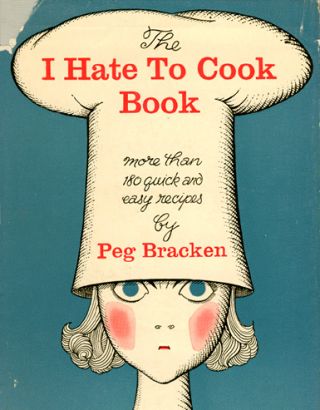
Friends
Are You a Bad Person for Hating to Cook?
The foodie movement says it's not OK to hate being in the kitchen
Posted April 1, 2013

The foodie movement has lately turned a lot of people on to the pleasures of cooking and eating well – America has been having a real culinary renaissance, which is awesome. Then, in the past few years, the whole locavore phenomenon has made caring where your food comes from seem like the good, environmentally sensitive thing to do. And the obesity epidemic has given home cooking a new sense of purpose.
All this has led to the idea, now common in progressive circles, that it is not OK to hate cooking. For example, here’s Michael Ruhlman, one of this country’s most prominent food writers (and one I generally admire), insisting that enjoying cooking is what separates us from the animals and the robots:
But I know for a fact [emphasis mine] that spending at least a few days a week preparing food with other people around, enjoying it together, is one of the best possible things in life to do, period. It’s part of what makes us human [emphasis mine]. It makes us happy in ways that are deep and good for us.
Now I love to cook, personally, and have spent much of my working life writing about food. But I have plenty of friends who would rather scrub the toilet than make dinner. Cooking doesn’t make them happy.
What should we say about these friends? Is there something wrong with them? Are they suffering for lack of this “deep and good” human pleasure? Have they simply not been properly taught the sensual delights of boiling up a big batch of spaghetti carbonara? Do they need to attend the Michael Ruhlman School of Best Possible Things in Life to Do?
Cooking has its indisputable virtues – it’s potentially cheaper and healthier than eating out, for one. But assuming you can afford to buy healthy take-out, or you have a partner who likes to cook, good for you, I say! Cooking – and communal eating – are common but hardly universal ways of deriving pleasure. I go rock climbing every now and then, and have met tons of climbers who get their pleasure and camaraderie on the crag (some even go with their kids!) and see eating as a total inconvenience, food as fuel. Do I identify? Not at all. Do I think there’s something wrong with them? Definitely not.
Frankly, if we could invent a healthy dinner in chewing gum form, a la Willy Wonka, that would suit some people just fine and I see nothing wrong with that (so long as it doesn’t turn you into a giant blueberry!). I get that it’s a good and worthwhile thing to teach people about food, but there’s something creepy and snobbish – not to mention historically inaccurate (through much of history, cooking was seen as a lowly task, to be farmed out to servant girls and even to dogs – seriously) – about insisting we all ought to love it. As Addie Broyles of The Feminist Kitchen says: “There are lots of ways to keep yourself challenged and engaged with the world around you. Food is just one of them.”

